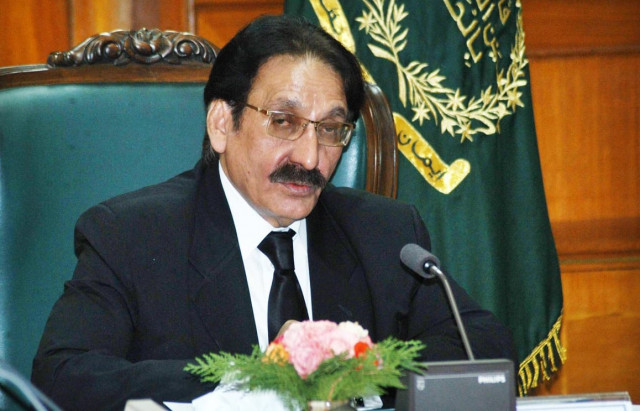Rental power projects case: Attorney speechless as top judges pose tough questions
Raja Parvez Ashraf’s counsel Waseem Sajjad requests more time to prepare arguments.

Chief Justice (CJ) Iftikhar Muhammad Chaudhry remarked on Wednesday that the apex court wanted to set an example for others by taking up irregularities in rental power projects (RPPs) so that transparency is ensured in every project in the future.
A division bench headed by the chief justice was hearing a suo motu case and two identical petitions filed by federal minister Faisal Saleh Hayat and PML-N MNA Khawaja Muhammad Asif against the award of contracts to RPPs. Waseem Sajjad, counsel for former minister for water and power Raja Parvez Ashraf, submitted that before his client took charge of the ministry, four RPPs were approved in a high-level meeting by Pakistan Electric Power Company and it was decided that rates should be close to tariffs charged by international power producers (IPPs). He said the National Electric Power Regulatory Authority (Nepra) had approved the electricity tariffs and not the former minister.
He said in March, 2008, four days before his client took charge of the ministry, the PM chaired a meeting in which it was decided that RPPs would start power generation within 100 days since people were demonstrating against power shortage on the streets. “Planning for 2009 was done in the meeting attended by almost 105 senior officials, including the Nepra chairman.” He stated that out of a shortage of almost 4,000 megawatts (MWs) of electricity, 2,200 MWs was to be produced through fast track IPPs, while RPPs were to meet the remaining shortfall.
In defence of the former minister who has been accused of committing irregularities in RPPs, the counsel stated that policy decisions are always made by the cabinet or by the prime minister, the minister has to assist him in making policies related to his portfolio. When Justice Khilji asked the counsel to show the policy to the court, Sajjad submitted that there was no single policy document but there were several decisions of the federal cabinet which would be produced. The CJP asked him why two parliamentarians had approached the court if RPPs were that transparent. “Is there any example of a minister being accused by incumbent parliamentarians?” The counsel submitted that some of the cabinet meetings were attended by Asif who was a coalition minister at the time.
The defence counsel was at a loss to reply to queries by the bench. Justice Khilji asked why no action was taken by Ashraf against those responsible for the RPPs’ failure. The CJP asked what relief was given to the masses after approving high tariffs for RPPs. “Why did your client not take notice of Reshma power plant which was producing 90 MWs instead of 231 MWs as specified in the contract?” Sajjad said there was persistent electricity shortage for which concrete measures have to be taken and requested for additional time to prepare his submissions. The case was adjourned for Thursday and the counsel was directed to conclude his arguments within two hours.
Published in The Express Tribune, November 24th, 2011.



















COMMENTS
Comments are moderated and generally will be posted if they are on-topic and not abusive.
For more information, please see our Comments FAQ